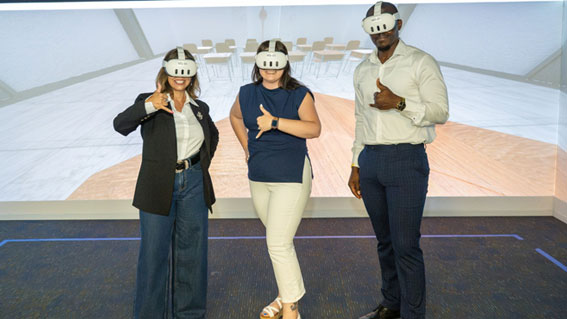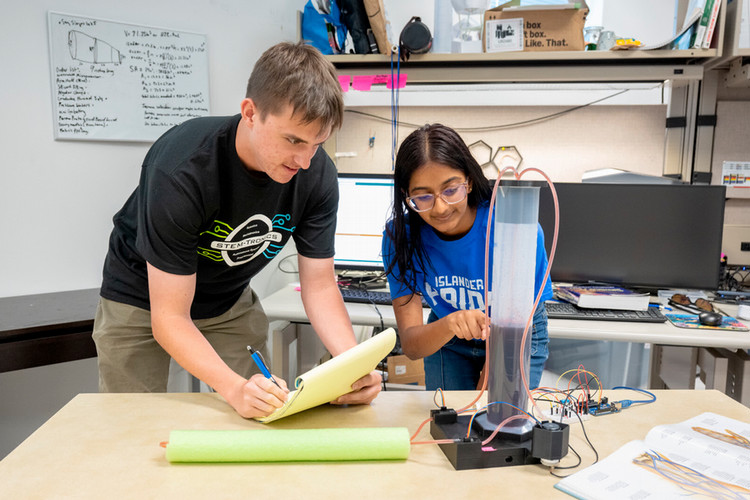Impact Multiplier Grant Gains Momentum; Fosters Positive Community Change
CORPUS CHRISTI, Texas – Along with the ever-important goal of preparing students for life beyond the classroom, a university is also tasked with engaging with the surrounding community. Creating broader impacts helping the Coastal Bend’s disadvantaged residents is one way Texas A&M University-Corpus Christi is exceeding this expectation. Established in early 2018, the Impact Multiplier Grant (IMG) is an important piece of this effort.
Created through the Division of Research and Innovation (R&I), IMG offers grant funding to Texas A&M-Corpus Christi faculty and staff who submit a winning proposal for a project that will positively impact the Coastal Bend community in some way. In its inception year, the Impact Multiplier Grant provided two projects – Ageless Art and Impactful Mental Health Interventions – both of which were incredibly successful, with $2,500 in funding each.
“This round, a record number of 35 applications were submitted – more than double the amount in IMG’s inception year,” said Joe Miller, director of Community Outreach and head of the IMG program. “With that many great proposals, it seems pretty obvious that there are a lot of people here at TAMU-CC with really good ideas and a heart for service. It’s clear to me that with this program we’re onto something special, so we decided to double our funding to $10,000.”
Miller and his team were so impressed with this year’s applicants, they not only awarded $5,000 each to two deserving projects, but even extended addition funds to a third applicant.
“There were so many programs worthy of funding,” said Miller, “but there was one that asked for only a fraction of the full award amount and we believed it had the potential to be incredibly impactful, so it was worth the stretch to go and find the extra money.”
Each grant winner this cycle will offer programs to impact youth in the Coastal Bend. This year’s winners include:
- “A Pilot Program for Teacher Research Experience in Robotics, Computer Science,” by Dr. Alaa Sheta, professor of computer science; Dr. Mamta Yadav, professional assistant professor of computer science; and Dr. Rosa Banda, assistant professor of educational leadership. The team received $5,000.
- “COping with Death through Art (CODART),” by Dr. Jennifer Gerlach, assistant professor of counselor education; Dr. Kristina Nelson, assistant professor of counseling and education psychology; and Dr. Sandy Griffith, assistant professor of clinical mental health counseling. The team received $5,000.
- “Islander L3 – Literacy, Language & Learning,” by Dr. Kelli Bippert, assistant professor of literary education. Bippert received $1,215.
Sheta and his team plan to teach robotics and computer science concepts to local teachers during the summer months. Through these new teaching methods, it is Sheta’s hope that young students will be inspired to pursue careers in STEM.
“For each of these teachers involved, we believe they will be able to spread their new-found knowledge to each student they interact with from here onwards,” said Sheta.
Through CODART, Gerlach will provide art-based counseling to children and families struggling with the loss of a loved one.
“We need to give a safe place for children and families to grieve and mourn,” said Gerlach. “Grieving children are more likely to develop negative health outcomes, behavioral issues, or substance abuse problems, but mental health interventions, like CODART, can lessen these negative effects by providing a safe place to explore their grief journey.”
The Islander L3 program will support local schools who have English as a second language learners by providing these students with tutoring, reading materials, and technology at no cost to the school.
“Our public schools often grapple with how to meet the needs to their diverse student populations,” said Bippert. “While one-on-one and small group instruction can be incredibly beneficial to students who need additional academic support, schools don’t always have the resources to make this happen. We will help fill this gap by utilizing our graduate and undergraduate students who each bring their experience, energy, and enthusiasm to our tutoring program.”
Dr. Ahmed Mahdy, vice president for Research & Innovation, says the IMG program is an important means of fulfilling the University’s institutional obligation to engage with the local community in beneficial ways.
“Our campus is full of people – faculty, staff, and students who have the ability and the willingness to create a positive impact in our community,” said Mahdy. “Anything we can do to support and empower those people is well worth the effort and the resources it takes to deliver the Impact Multiplier Program.”









































